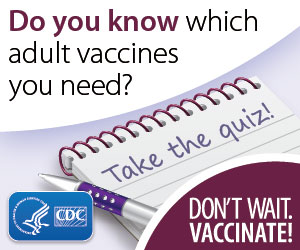Adults With Chronic Conditions: Get Vaccinated.

CDC recommends certain vaccines for adults in order to help prevent getting and spreading diseases. Recommended vaccines are especially important for those with chronic conditions, who are more likely to develop complications from certain vaccine-preventable diseases. Find out which vaccines CDC recommends you receive.
Vaccines are an important step in protecting adults against serious, sometimes deadly, diseases. Even if you were vaccinated at a younger age, the protection from some vaccines can wear off with time, or the viruses or bacteria that the vaccines protect against change so your resistance is not as strong. As you get older, you may also be at risk for vaccine-preventable diseases due to your age, job, hobbies, travel, or health conditions.
CDC recommends that all adults get the following vaccines:
- Influenza (flu) vaccine every year to protect against seasonal flu.
- Td vaccine every 10 years to protect against tetanus.
- Tdap vaccine once instead of Td vaccine to protect against tetanus and diphtheria plus pertussis (whooping cough) and during each pregnancy for women.
- Other vaccines you need as an adult are determined by factors such as age, lifestyle, job, health condition, and vaccines you have had in the past. Vaccines you need may include those that protect against: shingles, human papillomavirus (which can cause certain cancers), pneumococcal disease, meningococcal disease, hepatitis A and hepatitis B, chickenpox (varicella), measles, mumps, and rubella.
Adults with certain chronic conditions are more likely to develop complications, including long-term illness, hospitalization, and even death, from certain vaccine-preventable diseases. Talk to your healthcare professional to make sure you are up to date on the vaccines that CDC recommends for you.
Heart Disease
People with heart disease, or those who have had a stroke, have a higher risk of serious medical complications from the flu, including worsening of their heart disease. Among adults hospitalized with the flu during the 2015-2016 flu season, heart disease was among the most commonly occurring chronic conditions.
CDC recommends people with heart disease get a yearly flu vaccine. They should also get pneumococcal vaccines, once as an adult before 65 years of age and then two more doses at 65 years or older. Visit CDC’s heart disease and vaccination page to learn more.
Lung Disease
People with asthma, chronic obstructive pulmonary disease (COPD) or other conditions that affect the lungs have a higher risk of complication from the flu even if the condition is mild and symptoms are controlled. Since people with asthma and COPD have sensitive airways, inflammation caused by the flu can cause asthma attacks or make asthma and COPD symptoms worse. People with asthma, COPD, or other conditions that affect the lungs are more likely to develop pneumonia and other respiratory diseases after getting sick with the flu than those without these conditions.
CDC recommends people with asthma, COPD, or other conditions that affect the lungs get a yearly flu vaccine. If you have a lung condition, you should also get pneumococcal vaccines—once as an adult before 65 years of age, and then two more doses at 65 years or older. Your doctor may recommend additional vaccines based on your lifestyle, travel habits, and other factors. To learn more, visit CDC’s page on lung disease and adult vaccination.
Diabetes
People with type 1 or type 2 diabetes have a higher risk of hepatitis B virus infection. Hepatitis B can be spread through sharing of blood glucose meters, finger stick devices, or other diabetes care equipment such as insulin pens. People with diabetes, even if well managed, are more likely than those without diabetes to have complications from the flu such as pneumonia, which can lead to hospitalization. In addition, having an infection can make it more difficult to control blood sugar well.
CDC recommends people with diabetes get pneumococcal vaccines, once as an adult before 65 years of age and then two more doses at 65 years or older, a yearly flu vaccine, and a hepatitis B vaccine series if they’re between the ages of 19 and 59. If you are 60 years or older, talk to your doctor to see if you should get hepatitis B vaccine. To learn more, visit CDC’s page on diabetes and adult vaccination.
- Page last reviewed: August 14, 2017
- Page last updated: August 14, 2017
- Content source:
- National Center for Immunizations and Respiratory Diseases
- Page maintained by: Office of the Associate Director for Communication, Digital Media Branch, Division of Public Affairs




 ShareCompartir
ShareCompartir

